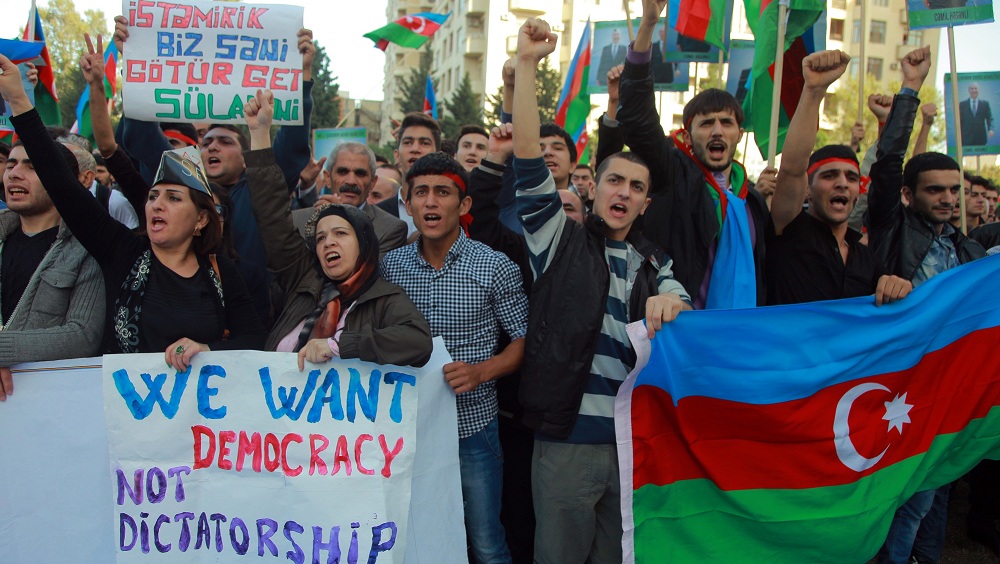Alwaght- After the dissolution of the Azerbaijan parliament on December 2, the competition among the political parties to lead in the sixth parliamentary election has intensified. The announcement of early elections and the preceding reshuffle of the cabinet signal a new political shift starting from 2018 has come to the country.
Parliament dissolution
Azerbaijan holds its elections every 5 years. The normal date for the next general election was November 2020. However, on November 28, the ruling New Azerbaijan Party (YAP) called on President Ilham Aliyev to dissolve the parliament. According to the national constitution, the state has 60 days after the dissolution of the parliament to hold elections. The elections, thus, are scheduled to be held on February 9.
Deputy Chairman and Executive Secretary of YAP Ali Ahmadov commented on the reason behind the dissolution saying that the ruling party saw the parliament incompliant with the reform policies of the president who, he said, pushed for engaging the younger generation into the politics and administration of the country. He added that the reforms led by President Aliyev should not be driven out of the legislation.
The remarks given as a justification to the recent changes have not been very much welcomed by affirmative approaches, with many of the political sides and experts arguing that the changes and new elections are meant to strengthen the position of Mehriban Aliyva, the first lady and Vice-president of Azerbaijan.
The opposition parties have disparaged Aliyev and the ruling party for the recent changes. Ali Karimli, the chief of Popular Front Party, said that the parliament was dissolved with prior plans so that they can hold a fully engineered election and repress the participation. He continued that protesting voters are growing larger in number day by day and there should not be the expectation of reforms from the early elections because they will definitely not be free.
In 2009, Aliyev removed the two-term limitation for president and in 2016 extended the presidential term from 5 years to 7 years. A large number of political activists were sent to jail under his presidency. He also brought forward the presidential elections in 2018 for six months. All these measures have formed a face of him among the Azerbaijanis largely autocratic. The opposition groups say that the parliament dissolution is also aimed at reinforcing his authoritarian rule.
Not much warm and competitive elections
The country held its last parliamentary election in 2015. According to a report published by Central Election Commission, 1,622 candidates have registered to join the race for parliamentary seats. 20 political parties and organizations said they are preparing to take part in the election. However, two large opposition parties, Popular Front Party and National Council of Democratic Forces, have said they boycott the vote. Karimli said that the election law has many restrictive items and does not comply with international standards. He further blasted the “regime” control over the commissions holding and supervising the elections. Karimli also blamed the government for destroying independent media, as he blamed the lack of a right for protest gatherings.
“There are more than 100 political prisoners, the opposition activists and politicians are under heavy pressures, there is no competitive atmosphere among the political parties and a policing regime is ruling the whole country,” Karimli was quoted as saying.
While some parts of the opposition body boycott the elections, others, like Musavat Party and Party of Hope, find participation as the most efficient way to fight the authoritarianism of the ruling circle. The ruling party which secured 74 seats in the previous election now also hopes to win the majority. Ahmadov in a television interview said the ruling party is able to save its majority in the parliament. He added that Aliyev, who also is the secretary-general of the YAP, is hopeful that the candidates named by the party will gain the majority of the votes in the upcoming elections.
The New Azerbaijan Party, which was founded in 1992 by Heydar Aliyev, bases its ideology on the centrality of the law, secularism, and nationalism. The central concentration of the party in the February election is the economy.
Aliyev owes his popularity over the years of his rule to the oil princes and oil exports. According to the World Bank reports, over the past 20 years oil has been a decisive factor in the Azerbaijani national economy, pushing up the gross domestic product (GDP) to $66 billion from 6 billion in 2014. This jump in the GDP is attributed to the astuteness of Aliyev rather than to the high oil prices. The president has now taken new steps for political changes in which the economy takes a center stage.
In October last year, the president accepted the resignation of Prime Minister Novruz Mammadov and appointed longtime ally and advisor Ali Asadov in a step towards completing one of the important puzzles of economic moves. As Aliyev and his allies control the presidency and the municipalities, they take a long step towards winning the majority in the new parliament.
On the other side, the opposition lacks the crucial alliance and unanimity to defeat the ruling party. Iqbal Agazade, the leader of the opposition Party of Hope, said that he will emphasize on strategic cooperation instead of electoral alliance. Other important parties like Popular Front Party and National Council of Democratic Forces have chosen not to join the race and boycott it. In October, Fuad Gahramanli, the deputy secretary-general of Popular Front Party, resigned from his position has his family disputes were given media publicity and circulated online, afflicting damage to the position of the party in the politics. All of the developments have moved in a way giving the ruling party potential victory in the elections.



























